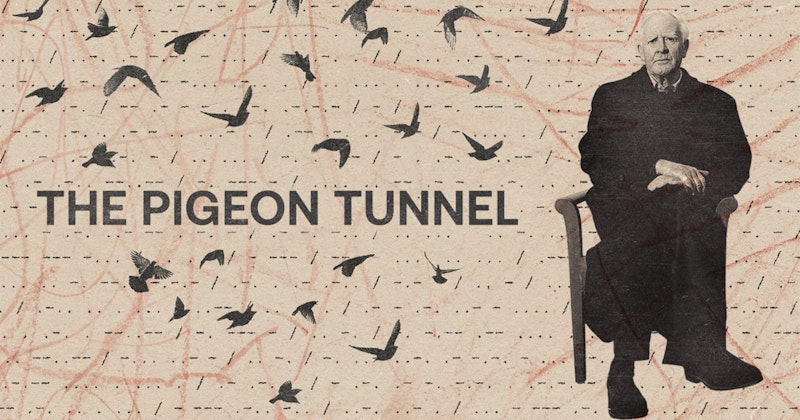David Cornwell, the man better known as John le Carré, never knew his mother and had a conflicted relationship with his father, who was a conman, arms dealer and grifter. As a result, Cornwell always felt as if he were a man on the run. His childhood laid the groundwork for a life of writing espionage stories and a love-letter documentary that does little to illuminate the viewer on anything of substance.
Errol Morris does his best to be the rakish interlocutor but always inserts himself where he isn’t needed and doesn’t have the wherewithal to extract information because Cornwell has lived this process in his novels so many times before. You think you’re getting something of substance but its only just enough to get to the next meeting.
And such is the premise—and flaw—of Morris’ latest documentary The Pigeon Tunnel, available on Apple TV+. The name comes from a title Cornwell wanted to use but never did. As a young boy, he was taken to Monte Carlo with his rogue father to watch as he and fellow compatriots engage in the act of shooting pigeons that’ve been released from their traps on a hotel roof, only to go back to their roosts if they manage to survive. And then are forced to do it all over again like a flying Sisyphus, or spy in a deadly nonsensical game.
While the film is shot with dramatic reenactments and footage from film adaptations to augment the thrills, at this point I think too many cinematographers suffer from glaucoma or just want to beat the audience over the head with their “life is dark" concept. Got it. Now please turn on more lights.
The central idea is that Carré was a very private and impenetrable man, the product of his inscrutable mother and charming, grifter father, Ronnie Cornwall. His childhood was deprived of love, but exciting. He conned his father into letting him go to Oxford to become a barrister, intending instead to study language. Some ups and downs occur. Father gets indebted to an astronomical sum. And son goes from pauper to relative prince, with a short detour as a spy who never lived out the escapades of his characters, never mind James Bond.
The inhumanity on both sides and disenchantment of the Cold War gets a lot of attention as well as traitor-turned-Soviet-defector Kim Philby. No surprise there as I believe it’s mandatory that every British espionage author must mention Philby in at least one novel. It does help to put into context the events that inspired the emotions that created the first real characters in the Cold War—the anti-Bond. The most telling quote in the documentary is when Cornwall says of the time that, “I felt that both sides, east and west ,were inventing the enemy they needed.”
Cornwall was one of the first to add grit and de-romanticize the genre. While I’d never put myself in the same league as a bestseller, as a novelist I abhor any writer who talks about writing as a giant wank. Morris’ attempts to turn Le Carré’s life into a thriller fall flat. Cornwall, who died in 2020, shuts down any talk of his private life. Not surprising considering the man whose central theme is betrayal doesn’t wish to justify his multiple infidelities during the marriage to his second wife.
The Pigeon Tunnel is as tightly controlled as any interrogation. The difference is that the interrogator, Errol Morris, is along for the ride. It’s true that without Cornwall’s contribution to the espionage genre there never would’ve been the greatest espionage show ever created: The Sandbaggers. But the documentary doesn’t look at his legacy or what came as a result. It’s just a moment in the life of a man who wasn’t extraordinary but wrote extraordinary stories.

